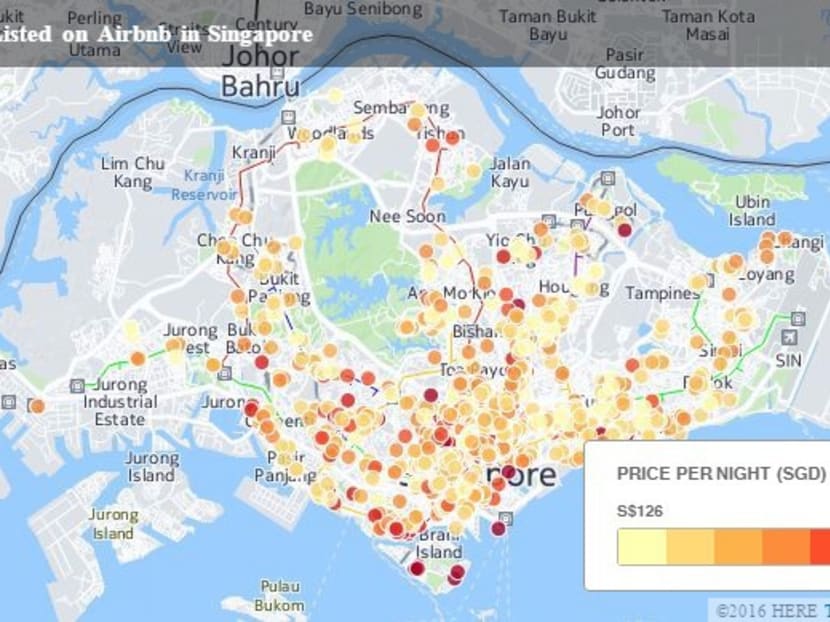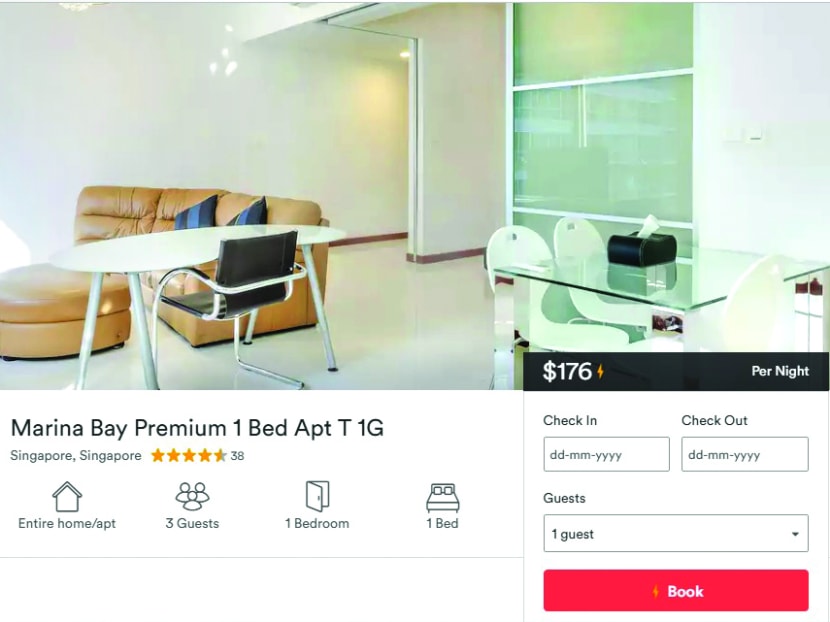Is your Airbnb host secretly making millions?
SINGAPORE — Airbnb is now the first website I visit whenever it is time for a vacation.


SINGAPORE — Airbnb is now the first website I visit whenever it is time for a vacation.
I love that its listings often offer properties at only a fraction of the price of a hotel room, and even more that its hosts actually live in the town and city I am visiting. During one of my trips to Nice, my brother and I chose to skip dinner at a crowded restaurant to spend an evening hanging out with our host and his dog over coffee. Every host I have met has also been able to give us recommendations on the best local markets to visit, or trails to hike.
Experiences such as these represent Airbnb at its very best, and articulate the company’s vision of creating a sense of belonging for every visitor, wherever he or she chooses to visit.
Yet, those who use Airbnb frequently enough will also find that not every listing is someone’s home, and not every host is a homemaker hoping to make extra cash from a secondary residence, or a frequent traveller renting out his home while he is away.
In fact, in Singapore alone, over 67 per cent of hosts who list their entire homes on Airbnb have more than one listing, and over 50 per cent of hosts have more than five listings, according to data obtained from Airbnb’s website by American writer Tom Slee in October and analysed by TODAY.
It is not difficult to imagine why so many people have so many listings. One host known as “Hannah” on the site has as many as 57 listings — all of them entire apartments. She stands to make more than S$4.9 million in revenue, if every single one of her apartments is rented out every single day of the year.
And she is only one of many hosts who have dozens of listings on the site. There’s “Nicholas” with 49 listings, who stands to make S$4.5 million in revenue a year; “Vincent” with 52 listings, who stands to make more than S$4.2 million; and “Kevin” with 47 listings and S$4.8 million in potential revenue. The list goes on.
AIRBNB’S CRACKDOWN
It is a tricky issue, and one that Airbnb has vowed to deal with. A spokesperson from the company told TODAY that it removes hosts and listings when they “do not reflect our vision for our community and do not offer the authentic experience they seek”.
“Around the world, the overwhelming majority of our hosts who share their entire home or apartment share only one listing. They are everyday people who open up their homes to travellers to earn a little extra income and pay their bills,” said the spokesperson, who declined to provide exact numbers.
According to Airbnb, a typical host in Singapore also only makes approximately S$5,120 annually from sharing a home — far lower than the S$4.9 million that could potentially be generated from 57 listings.
Differentiating between those who are running multi-million-dollar businesses on their site and those who are renting their own homes is a difficult problem, but one that Airbnb has to solve soon before its values are undermined.
The company is already increasingly facing regulation in cities around the world, including San Francisco, Berlin, Barcelona and Amsterdam.
In New York, Airbnb is battling a new Bill that would allow the authorities in New York state to crack down on hosts who advertise listings on rental sites like Airbnb for stays of less than 30 days. Lawmakers behind the Bill claim businesses such as Airbnb are disruptive to New York, making it increasingly difficult for those who live in the city to find affordable housing. In return, Airbnb filed a lawsuit against New York state, saying that the new law “ignored the voice of tens of thousands of New Yorkers”.
“A majority of New Yorkers have embraced home sharing, and we will continue fighting for a smart policy solution that works for the people, not the powerful,” the company said in a statement on its website, adding that 78 per cent of Airbnb hosts in New York earn low, moderate or mid-range incomes.
Here in Singapore, short-term stays of less than six months are illegal for private residential properties. According to the Urban Redevelopment Authority (URA), enforcement action was taken against 103 cases of unauthorised short-term subletting in private residential properties from Jan 2014 to June this year. TODAY also understands that while short-term rentals are illegal, it is not illegal to list an apartment on a rental site like Airbnb.
The government is still reviewing the issue of short-term stays in Singapore, following its public consultation exercise in 2015 in which it sought feedback from the public and stakeholders on whether short-term stays in private residential properties should be allowed.
“The issue of short-term stays is complex, multi-faceted, and has wide-ranging implications. It warrants a careful and balanced review, without a rush to conclusion,” said a URA spokesperson. “For example, we must carefully study its potential impact on neighbouring residents, vis-a-vis regulatory requirements to ensure the safety and well-being of occupants.”
THE BENEFITS OF SHARING
Yet there are those who believe that hosts on Airbnb should be free to offer whatever resources they have to whomever they choose. As long as Hannah’s visitors and neighbours are happy with the arrangement, why shouldn’t she be allowed to run her business?
Jim Tan, president of the Sharing Economy Association of Singapore, asserts that “the sharing economy incentivises people to offer their resources, be they existing or additional, which they wouldn’t offer otherwise”.
“What if underutilised resources still can’t match the demand for sharing? This is where the sharing economy adds value by creating additional supply to match the unmet demand,” said Tan. “Whether or not creating additional supply is meant to merely earn a personal additional income or to make a business is beside the point.”
Airbnb users are sanguine about hosts raking in the bucks even if they are their very neighbours. “I don’t mind (if my neighbours list their properties on Airbnb even if they don’t live there), as long as their visitors are not a public nuisance,” said Airbnb user Arif Rajab. “They need to abide by the same rules, like no smoking or drinking in the common areas, or keeping the volume of the television inaudible outside their homes, and not harassing their neighbours.”
Property analysts TODAY spoke to say such a practice is unfair to the industry.
Ku Swee Yong, CEO of International Property Advisor, suggested that some of these listings could be posted by companies who "lease apartments on a long-term basis, say for two years, and use Airbnb to operate a chain of hotel rooms" on a short-term basis.
Pointing out that this makes the playing field uneven, Ku said such instances are occurring at the expense of proper hoteliers and service apartment operators, who have complied with strict guidelines under the Hotels Act. "Now we are allowing individual operators, who do not have to comply with the safety and security aspects of things, who are making money at the expense of hoteliers."
Donald Han, managing director of Chestertons, a real estate consulting company, added that multiple listings could also be the result of some agents who do portfolio risk management, meaning they look after extra properties in some owners' portfolios and attempt to lease them out. While some agents will try to find long-term tenants, he said, "in some cases, they will try to get better rates by using Airbnb's daily or weekly rates".
"It's against the law. They are playing around with danger," he said.
p.p1 {margin: 0.0px 0.0px 0.0px 0.0px; font: 12.0px 'Helvetica Neue'; -webkit-text-stroke: #000000} span.s1 {font-kerning: none}





